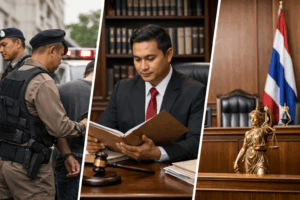In the vibrant world of digital entrepreneurship, crafting and disseminating digital content is a powerful strategy for engaging audiences. However, as entrepreneurs embark on creating content, they must be vigilant about regulations governing the digital sphere. This comprehensive guide explores key aspects of regulations on digital content in Thailand, shedding light on how entrepreneurs can navigate legal complexities, avoid potential pitfalls, and ensure compliance. Additionally, we delve into the pivotal role a leading law firm in Bangkok plays in providing expert guidance on content-related legal matters.
Understanding Regulations on Digital Content in Thailand
1. Legal Landscape for Digital Content:
Thailand has established a legal framework to govern digital content creation and dissemination. Entrepreneurs need to be familiar with laws such as the Computer Crimes Act and the Content Regulation under the Electronic Transactions Act, which outline offenses related to inappropriate online content.
2. Offensive or Illegal Content:
Entrepreneurs must exercise caution to avoid creating or disseminating content that may be considered offensive or illegal. This includes content that violates cultural norms, promotes hate speech, or engages in illegal activities. A law firm in Bangkok can provide insights into what constitutes offensive or illegal content under Thai law.
3. Liability for User-Generated Content:
Platforms that allow user-generated content must understand the liability they carry for content posted by users. While the responsibility primarily lies with the content creator, platforms can also face legal repercussions if they do not take reasonable measures to address illegal or harmful user-generated content.
4. Content Moderation Policies:
Implementing robust content moderation policies is essential for platforms hosting user-generated content. Entrepreneurs should clearly outline acceptable use policies, establish reporting mechanisms, and promptly address content that violates regulations. Legal experts from a law firm in Bangkok can assist in crafting effective content moderation policies.
5. Intellectual Property Considerations:
Digital entrepreneurs must also consider intellectual property laws when creating and disseminating content. Unauthorized use of copyrighted materials can lead to legal consequences. A law firm in Bangkok specializing in intellectual property can provide guidance on avoiding copyright infringement in digital content.
Practical Steps for Content Compliance
1. Conduct Content Audits:
Regular content audits help entrepreneurs assess their digital content for compliance with regulations. A law firm in Bangkok can assist in conducting comprehensive audits, identifying potential risks, and recommending corrective actions.
2. Update Terms of Service and Privacy Policies:
Ensuring that terms of service and privacy policies are up-to-date is crucial. A law firm in Bangkok can review and update these documents to align with the latest legal requirements, providing clarity on user responsibilities and platform liabilities.
3. Implement Robust Content Moderation Tools:
Utilize advanced content moderation tools to automatically identify and filter inappropriate or illegal content. A law firm in Bangkok with expertise in technology law can guide entrepreneurs in selecting and implementing effective moderation solutions.
4. Provide User Education:
Educate users on acceptable content creation and sharing practices. A law firm in Bangkok can assist in developing user education materials that outline community guidelines and legal responsibilities, fostering a responsible online community.
Legal Expertise: A Cornerstone of Digital Content Compliance
1. Defamation and Libel Considerations:
Understanding defamation and libel laws is crucial for digital content creators. A law firm in Bangkok can provide guidance on what constitutes defamation and how to avoid legal issues related to false statements that harm reputation.
2. Freedom of Expression Balancing Act:
While regulations exist, entrepreneurs must also navigate the delicate balance between freedom of expression and legal restrictions. A law firm in Bangkok can offer insights into how to uphold freedom of expression while staying within the bounds of the law.
3. Crisis Management Support:
In the event of a legal crisis related to digital content, having legal support is indispensable. A law firm in Bangkok with experience in media and content law can provide immediate legal assistance, helping entrepreneurs navigate the complexities of potential legal disputes.
4. International Content Compliance:
For digital entrepreneurs with an international audience, understanding global content regulations is vital. A law firm in Bangkok with an international focus can provide insights into global content compliance, ensuring alignment with diverse legal frameworks.
Conclusion: Nurturing a Responsible Digital Presence with Legal Guidance
In conclusion, digital entrepreneurs in Thailand can cultivate a responsible and compliant digital presence by understanding and adhering to regulations on digital content. Partnering with a leading law firm in Bangkok specializing in content and media law offers a strategic advantage, providing not only legal support but also expert insights to navigate the nuanced landscape of digital content regulations.
The synergy between creative expression and legal expertise is a powerful formula for success in the dynamic world of digital entrepreneurship. By integrating legal guidance into their content strategies, entrepreneurs can confidently engage audiences, build a positive online presence, and position themselves for sustained success in the digital landscape of Thailand.
Contact : Siam Center Law Group by calling +66(0) 2 648 5041, +66(0) 2 648 5042





